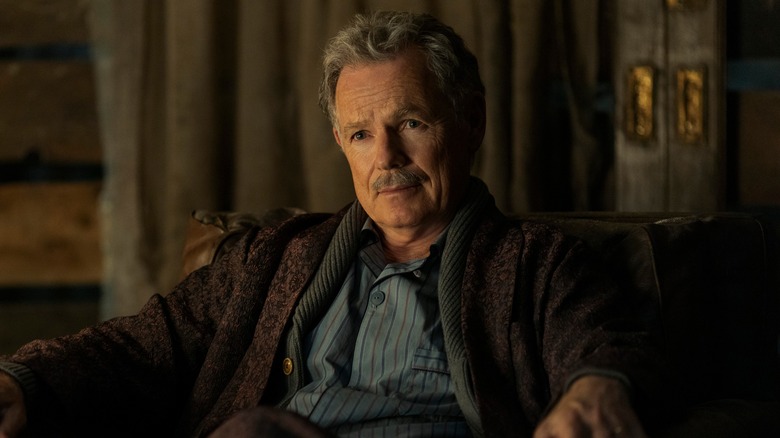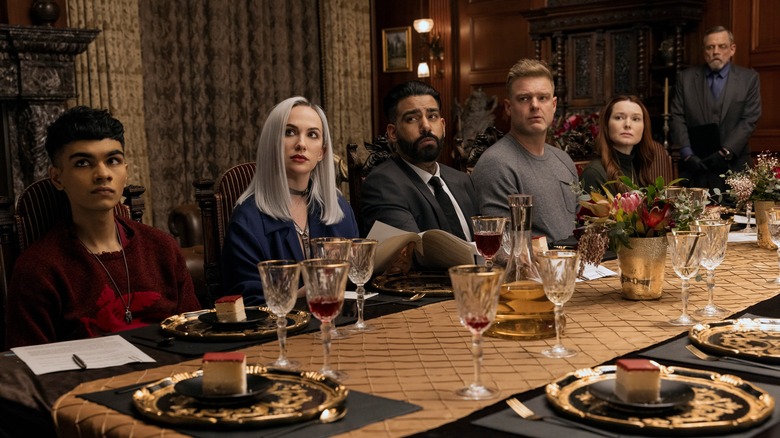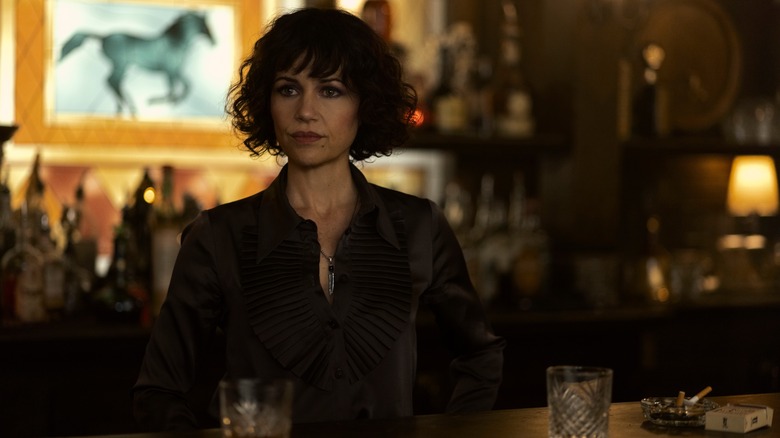The Fall Of The House Of Usher Review: Family Is Hell
- Terrific cast
- Sumptuous production design
- Wonderful black comedy
- Can't always walk the tonal lines quite as well as it wants to
It's been five years since writer-director Mike Flanagan made his first Netflix horror series, the beloved "The Haunting of Hill House," and now the massive creative endeavor he launched with that show is coming to a close. Flanagan's latest series for the streaming giant, "The Fall of the House of Usher," marks his last major project for Netflix before he departs for a deal with Amazon, giving the new show an extra weight that should make his audience lean forward and see how exactly he chose to go out.
Like "Hill House," "House of Usher" is a sprawling ensemble piece derived from the works of one of horror's great literary giants. It's sumptuous, detailed, and full of the kind of narrative flourishes that Flanagan excels at through an unrelenting passion for structural symmetry and thematic resonance. Like each of the four other Netflix series he's created in his time with the streamer, it's a glorious, deep well of horror and worldbuilding, and while it might not pack the same punch that "Hill House" did upon its 2018 debut, it's also a reminder of Flanagan's wit, bite, and often overlooked versatility.
A family crumbles
Based on the works of Edgar Allan Poe and borrowing liberally from many of his best-known premises to great effect, "The Fall of the House of Usher" opens with the uber-wealthy Usher family in freefall. Patriarch Roderick Usher (Bruce Greenwood) and his twin sister Madeline (Mary McDonnell) have built a pharmaceutical empire on the back of one brilliant painkiller — sound familiar? — and now it's all crashing down amid a criminal case pushed by dogged prosecutor C. Auguste Dupin (Carl Lumbly). But it turns out that the criminal case is the least of their worries.
Staring down his own mortality, Roderick is suddenly faced with a prospect more horrifying than his own death: the deaths of his children. As the walls close in on the Usher empire, it seems that none of them are immune from strange and brutal accidents and encounters, from heir-apparent Frederick (Henry Thomas) to medical researcher Victorine (T'Nia Miller) to lifestyle influencer Tamerlane (Samantha Sloyan). As the kids begin to very publicly and very gruesomely meet their fates, Madeline, Roderick's PR-spinner daughter Camille (Kate Siegel), and the family's devoted legal fixer Arthur Pym (Mark Hamill) urge him to circle the wagons, fight for what's his, and preserve his legacy.
But Roderick knows there's something else at work here. A karmic bill, the price of everything he's built, is coming due, and to understand why and how, he has to look back at all of it, his entire strange story, and see the roots of the darkness he's wrought.
Another Mike Flanagan triumph
As with his previous literary remixes, particularly "The Haunting of Hill House" and its follow-up "The Haunting of Bly Manor," "The Fall of the House of Usher" is packed with references to Edgar Allan Poe tales great and small, not to mention the author's many poems. Character names, plots, and even direct quotes make their way into every fiber of the series, setting the tone for what's to come — and thankfully, it's a tone that sets the show apart. Like Poe's own grandiose stories of dark adventure and macabre death, "House of Usher" is operatic, darkly comic, and rich with bombast. Focusing on an extremely wealthy family, many members of which are not the best people you're likely to find, gives Mike Flanagan and his team of writers license to get nastier, funnier, and more impish than his previous series were, and the whole crew leaps at the chance.
As the Usher family legacy starts to crumble, the show dives headlong into picking them apart with a kind of devilish glee, throwing in "Succession"-style monologues laced with profanity while the horror elements creep up behind each and every character, setting up some of the most elaborate and lavish death scenes of Flanagan's career. You know that many of these people are going to die, because the show tells you, but even with that awareness, you can't be prepared for exactly how Flanagan brings the hammer down, and that makes the series a delight for horror fans.
It's also, quite plainly, a delight for the cast. Everyone involved — from Bruce Greenwood with his brooding smolder, to Kate Siegel with her bat-out-of-hell energy, to Flanagan favorite Rahul Kohli as a drug-addled gamer — is giving it everything they've got, taking big, juicy bites out of this garish apple with each scene. The real star, though, is Carla Gugino as Verna, a mysterious figure who emerges as a key player in the story due to what she knows about the Usher family. Her presence as yet another Flanagan favorite is welcome, but even with their long history, Gugino's never been quite this hypnotic in a Flanagan production, and her performance is a joy to see.
These elements combine to give us something almost entirely unlike the other, more emotionally driven work in the Flanagan Netflix catalog, and that's something to be savored for fans who've grown used to the particular rhythm of this storyteller in long form. It doesn't always work as well as series like "Hill House" or "Midnight Mass" — even Flanagan can't always conquer the delicate tonal balance of this story — but there's an ambition within "House of Usher" that's both admirable and infectious. This is Flanagan and his entire team just going for it, and it's insanely fun to watch. "The Fall of the House of Usher" is proof that Flanagan still has plenty to say in the horror space, and it's a wonderful sendoff for his Netflix era. Don't miss it this Halloween season.
"The Fall of the House of Usher" premieres October 12 on Netflix.


